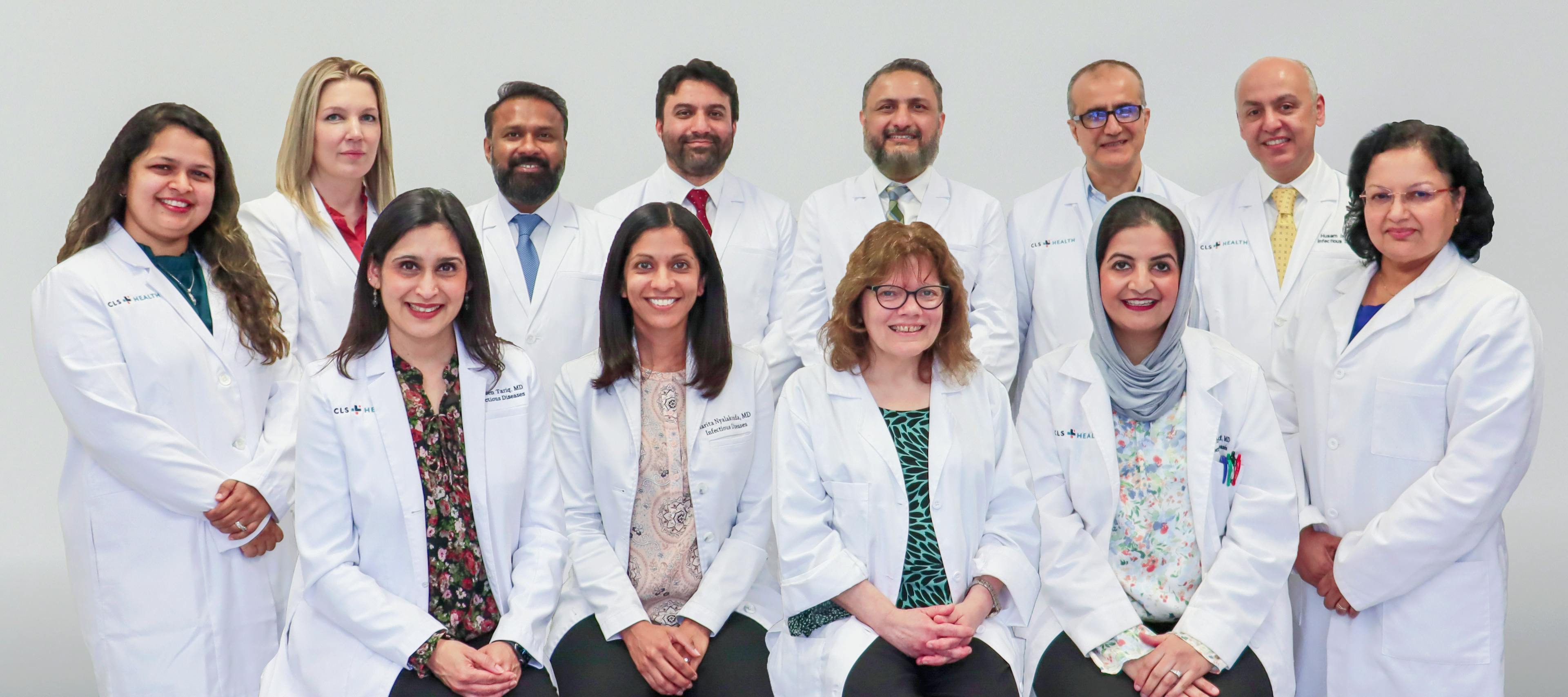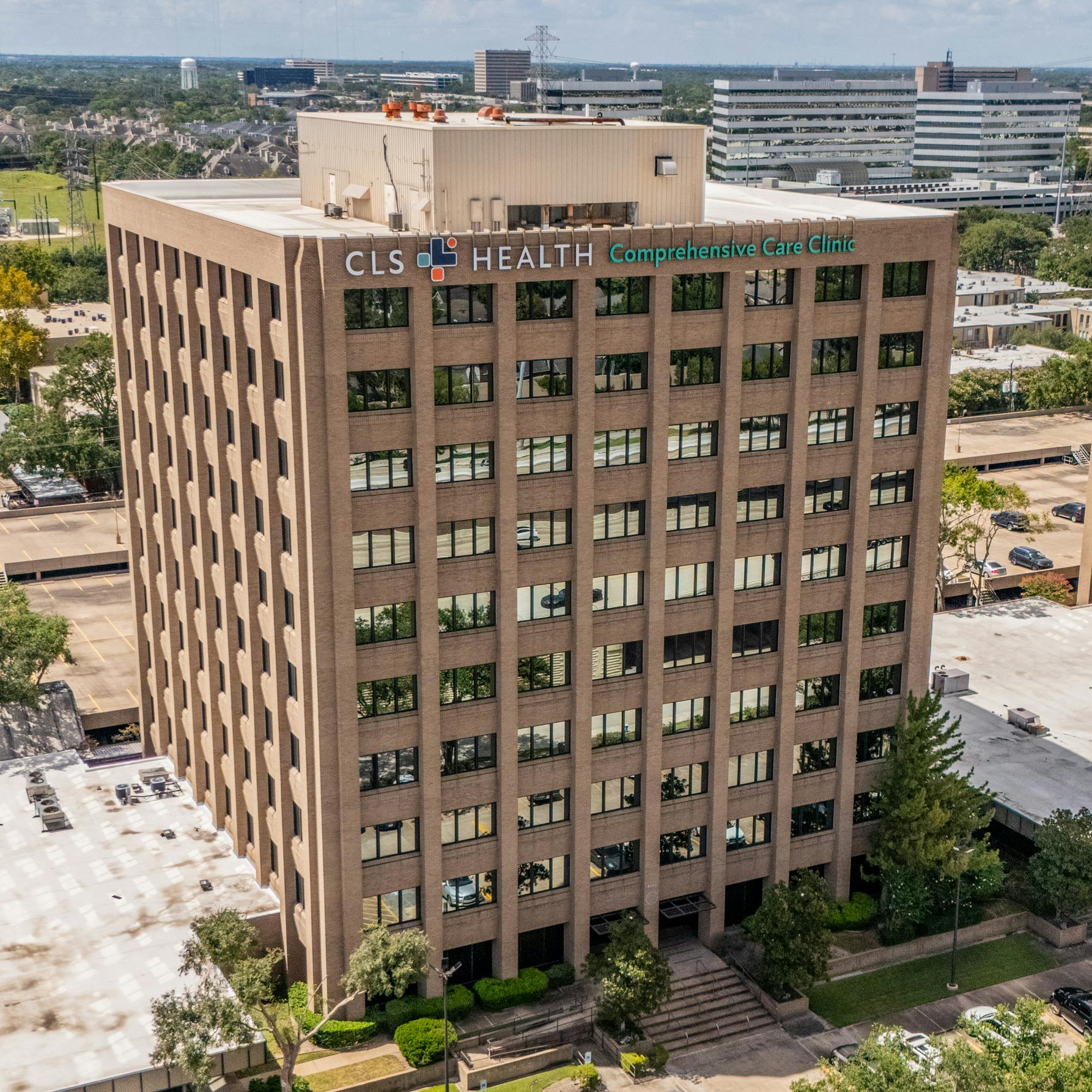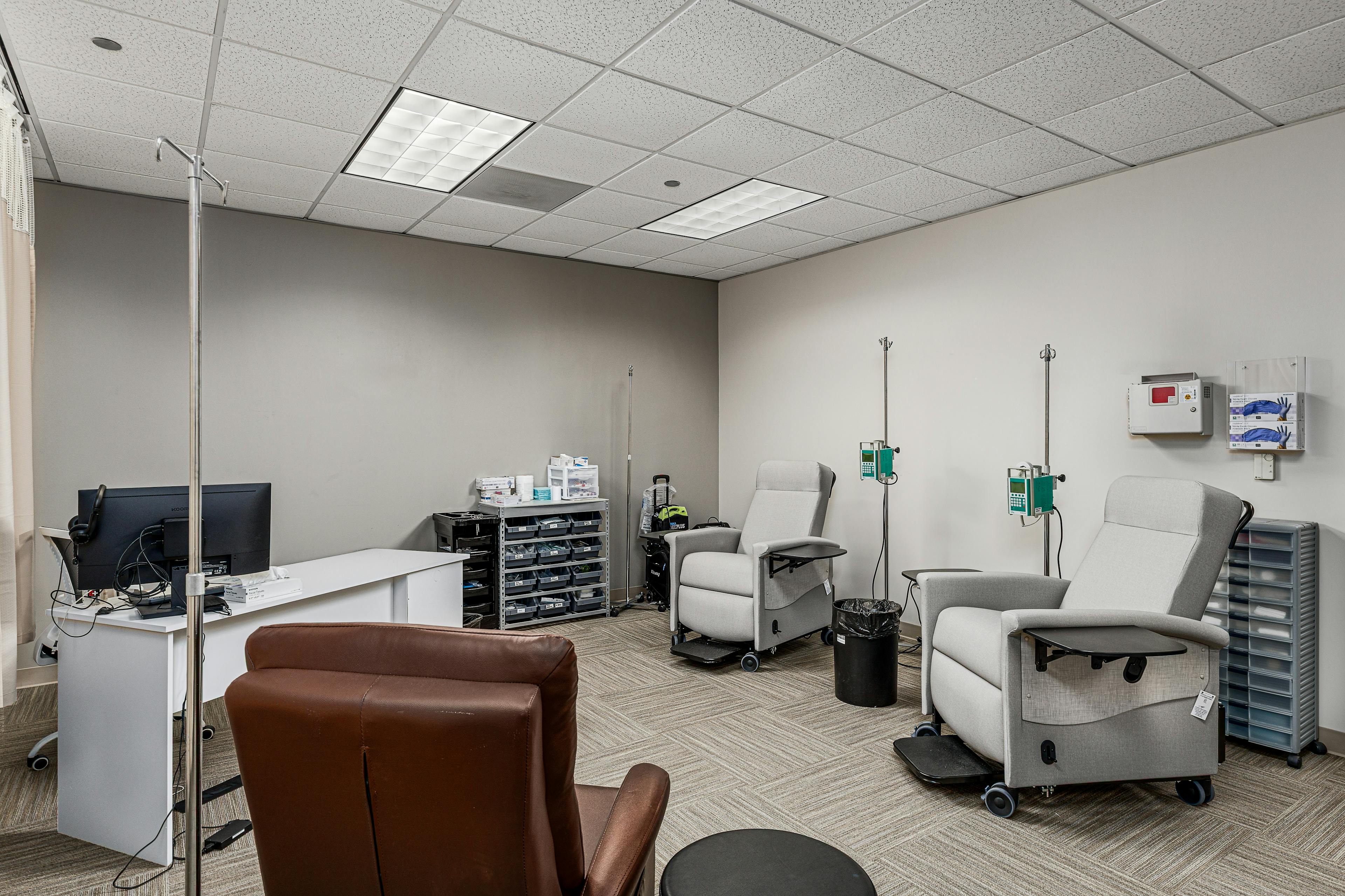Infectious Disease

Premier Infectious Disease Care
CLS Health’s experienced infectious disease specialists doctors diagnose and treat the full range of common and rare communicable diseases. Our patients receive the highest standard of compassionate, attentive, and thorough care—from initial consultations through follow-up visits.

Diagnostic Testing
We perform on-site diagnostic tests at our clinic, enabling quick decision-making and immediate commencement of treatment; these include:
- CBCs
- Blood & urine cultures
- Multiplex PCR
- X-rays, CT scans, and MRIs
For urgent cases like sepsis, IV antibiotics are administered promptly in our infusion suite.
Follow-Up Care
We ensure patients have easy access to post-discharge follow-ups, which are crucial for ongoing recovery and health management. Appointments can usually be scheduled within 24 to 48 hours for urgent needs, and within a week for routine visits.
Providers

Infectious Diseases

Hospital Medicine, Infectious Diseases

Infectious Diseases

Infectious Diseases

Infectious Diseases

Infectious Diseases

Infectious Diseases

Infectious Diseases

Infectious Diseases

Infectious Diseases
Conditions Treated
At CLS Health, we diagnose and treat complex bacterial infections such as bone and joint infections, endocarditis, sepsis, and tuberculosis. Our specialists use advanced testing and antimicrobial therapies to target infections like diabetic foot wounds, surgical or post-operative infections, and urinary tract infections. We also manage serious cases such as C. difficile colitis and intra-abdominal or spinal infections, ensuring patients receive precise, coordinated care to restore health and prevent recurrence.
Our team provides comprehensive care for viral illnesses, including HIV/AIDS and chronic hepatitis B and C, helping patients manage long-term viral conditions safely and effectively. We also diagnose and treat severe respiratory infections like influenza (flu) and provide specialized monitoring for post-transplant infections in immunocompromised patients. Our goal is to support the immune system while preventing complications from persistent or opportunistic viruses.
CLS Health treats invasive fungal infections affecting the lungs, skin, or internal organs with precision and compassion. We also specialize in diagnosing and managing tropical and parasitic diseases acquired abroad — including malaria, dengue, and chikungunya — through travel-related infectious disease expertise. Our care plans emphasize early detection and targeted therapies to ensure faster recovery and reduced transmission risk.
Our specialists manage infections involving the brain and nervous system, including meningitis, encephalitis, and brain abscesses. We also investigate chronic fevers of unknown origin to identify underlying infections or inflammatory conditions. Through a combination of advanced imaging, lab testing, and multidisciplinary care, CLS Health helps patients find answers and relief from persistent or unexplained symptoms.
We provide expert care for chronic or complex skin and wound infections, including pressure ulcers and post-surgical wounds that are slow to heal. Our infectious disease physicians collaborate closely with wound care specialists to reduce infection, promote healing, and prevent complications. We tailor each treatment plan to the patient’s overall health and recovery goals.
Treatments & Services
CLS Health offers comprehensive evaluations for acute and chronic infections, including drug-resistant or relapsing cases. We also provide pre-travel immunizations, preventive medications, and counseling for international travelers. Our infection control programs focus on preventing hospital-acquired infections and limiting the spread of antimicrobial resistance within healthcare and community settings.
Our infusion centers deliver advanced therapies such as IV antibiotics for severe bacterial infections like osteomyelitis, sepsis, and endocarditis. We also provide IV antifungals, antivirals, and immunoglobulin (IVIG) therapy for immune-compromised patients, along with biologic or steroid infusions for complex inflammatory conditions. Each treatment is monitored closely for safety and effectiveness under physician supervision.
For patients unable to maintain adequate nutrition due to infection-related complications, we offer Total Parenteral Nutrition (TPN) and other supportive therapies. Our team coordinates closely with dietitians and care specialists to promote healing, immune recovery, and long-term wellness.
CLS Health provides comprehensive infusion therapy services for patients who require intravenous (IV) medications that cannot be taken orally. Treatments are administered either at home or in our office-based Infusion Centers, depending on the patient’s medical needs, insurance coverage, mobility, and comfort preferences.
Infusion therapy delivers medication directly into the bloodstream using a needle or catheter. This method is often prescribed when oral medications are ineffective, unavailable, or poorly absorbed by the body.
Common conditions treated with infusion therapy include infections, autoimmune disorders, dehydration, and certain chronic diseases that require regular IV medication.
For patients who qualify, CLS Health offers the convenience of home infusion therapy.
Our experienced nursing team provides thorough instruction to patients and caregivers on how to safely prepare, administer, and manage their treatments at home.
This approach allows patients to continue essential therapy in the comfort and privacy of their own homes, reducing the need for hospital or clinic visits while maintaining high standards of care and safety.
Patients who prefer or require a clinical setting can receive treatment at one of our CLS Health Infusion Centers, conveniently located in Houston and Webster, TX.
Our centers are designed for both comfort and safety, featuring:
- Recliner chairs for longer infusions
- Free Wi-Fi and accessible amenities
- Onsite nurses and attending physicians overseeing every treatment
Receiving infusions in-office ensures direct clinical supervision, reduces dependence on home health services, and provides immediate access to medical staff if assistance is needed.
Our Infusion Centers provide a full range of services, including:
- Administration of medications via peripheral IV lines, PICC lines, or central lines
- Line maintenance and flushing to prevent complications
- Laboratory testing to monitor treatment progress and patient safety
- Interpreter services for non-English-speaking patients to ensure clear communication and comfort throughout treatment
Each patient’s infusion schedule is personalized based on their diagnosis, medication, and response to therapy.
Treatment frequency can vary from a single session to multiple infusions per week, depending on the condition type and severity.
Your CLS Health care team will collaborate closely with your referring physician to design a plan that ensures optimal effectiveness, safety, and convenience.
Don't see your insurance listed? We may still accept it! CLS Health updates accepted insurance plans regularly. Please call (281) 724-1860 to verify your coverage.
- Aetna Select
- Open Access Selects
- Elect Choice
- Aetna Open Access Elect Choice
- Aetna Choice POS II
- Managed Choice
- Open Choice PPO
- Aetna Medicare Advantage Plans
CLS Health does not accept:
- Aetna CVS Marketplace Plans
* Some providers may not accept this insurance, please call to confirm
- Superior Ambetter Core (Complete, Clear, Focused, Standard Silver and Gold)
- Superior Ambetter Value (Clear Value Silver, Focused Value Silver, CMS Standard Silver & Gold Value, Everyday Value Gold)
- Superior Ambetter Virtual (Ambetter Virtual Access Silver, CMS Standard Virtual Access Basic Silver, Ambetter Virtual Access Gold)
- Superior Health Plan CHIP*
- Superior Health Plan MAPD (Medicare Advantage Prescription Drug)
- Superior Health Plan Medicare
- Superior Health Plan MMP Medicaid*
- Superior Health Plan MMP Medicare
- Superior Health Plan STAR*
- Superior Health Plan STAR Kids*
- Superior Health Plan STAR+PLUS*
CLS Health participates in most Blue Cross Blue Shield plans including:
- Blue Choice PPO
- Blue Essentials
- Blue Essentials Access
- HealthSelect
- HealthSelect of Texas In Area
- Consumer Directed HealthSelect in Area
- HealthSelect of Texas Out of State
- Consumer Directed Health Select Out of State
- HealthSelect Secondary 65+
- Medicare Advantage HMO
- Medicare Advantage PPO
- Medicare Advantage Value HMO
- POS
- Traditional/Par Plan
- TRS-Active Care
- TRS-Care Standard
- BCBS MyBlue Health (Marketplace)
*Some providers may not accept Community Health Choice, please call to confirm
- MarketplacePremier
- Medicaid*CHIPCHIP PerinateSTAR
- Medicare AdvantageDual-Special Needs Plan (D-SNP)
- ChoiceCare PPO
- EPO
- HMO
- HMO Premier
- Medicare Advantage Plans
- HumanaChoice - Medicare Advantage PPO plan
- Humana Gold Choice - Medicare Advantage Private Fee-for-Service (PFFS) plan
- Human Gold Plus - Medicare Advantage HMO & Special Needs Plan
- Military (TRICARE South Region Military Health Plan)
- POS - including Choice POS, National POS Open Access/Plus and Preferred POS Open Access.
- PPO
*Some providers may not accept United Healthcare, please call to confirm
- Commercial, HMO, POS, EPO and PPO Plans (Charter, Choice,Core, Doctors Plan, Freedon, Heritage, Navigate, Nexus ACO, Options PPO, Passport Connect, Select)
- Indemnity
- Medicare Advantage (AARP, Care Improvement Plus, C-SNP, D-SNP, I-SNP, Erickson Advantage, ERS Medicare Advantage, TRS-Care Medicare Advantage, UnitedHealthcare Chronic Complete, UnitedHealthcare Connected (Medicare-Medicaid Plan), UnitedHealthcare Dual Complete, UnitedHealthcare Group Medicare Advantage PPO, United Healthcare Medicare Complete)
- Community Plans* (CHIP, CHIP Perinate, Star, Star Kids, Star Plus, MMP)
- Wellmed (Wellmed Dual SNP Focus, Wellmed Medicare Advantage Focus)
*Some providers may not accept Wellpoint, please call to confirm
- Medicaid (All Texas Plans Including the Below)*
- CHIP
- CHIP Perinate
- STAR
- STAR+PLUS
- STAR Kids
- Medicare Advantage
- C-SNP
- D-SNP
- I-SNP
- Medicare Advantage HMO
- Medicare-Medicaid (MMP)
- Medicare-Medicaid Program (MMP)
- STAR+PLUS MMP
*Some providers may not accept insurance, please call to confirm
PPO Networks
- Beechstreet PPO
- Carnival Cruise Lines PPO
- Envolve Benefit Options Vision-PPO, HMO
- First Health
- Curative/First Health
- Galaxy Health Network
- HealthSmart Preferred Care
- Accel
- Healthsmart Payors Organization
- Multiplan PPO
- Tricare (Humana) PPO/Prime
Employer-Specific Plans
- Brazoria County Employees – Aetna TPA Brazoria County Employees
Workers’ Compensation Plans
- Workers’ Comp
- Auto & Workers’ Comp
Medicare and Medicare Advantage
- Medicare Traditional
- Medicare Advantage
- Memorial Hermann Health Solutions Commercial and Medicare
- Molina Medicare Complete Care HMO SNP
- Medicare-Medicaid Program (MMP)
- STAR+PLUS MMP
- Alignment Health Plan
- AllyAlign Health
- American Health Plans
- Florida Complete Care
- Gold Kidney Health Plan
- Imperial Health
- Independent Health
- Kaiser Foundation Health Plan of Washington
- Kaiser Foundation Health Plan of Colorado
- Mass Advantage
- Presbyterian Health Plan
- PriorityHealth
- Provider Partners
- SCAN
- UCare
- Vantage Health Plan
- Verda Healthcare
- Zing Health
Medicaid and CHIP Programs
- Molina Healthcare* (Marketplace, Medicaid, CHIP, CHIP Perinate, STAR, STAR Kids, STAR+PLUS)
- Texas Children's Health Plans*
- TMHP (Traditional Medicaid) Traditional Medicaid
Specialty Plans
- VA Community Cares Network CCN
FAQs
An infectious disease (ID) physician specializes in diagnosing and treating infections that do not require surgery. They manage diseases caused by bacteria, viruses, fungi, and parasites, including severe conditions like AIDS and meningitis.
ID physicians develop personalized treatment plans and advise on preventive measures, such as immunizations. Your primary care physician may refer you to an ID specialist if an infection is difficult to control or associated with a high fever. With advanced diagnostic tools, ID physicians can identify the cause of your infection and provide optimal treatment.
You should seek medical attention if you experience severe symptoms, such as high fever, difficulty breathing, rapid heart rate, or if your symptoms worsen or don't improve with initial treatment. Additionally, if you have a weakened immune system or chronic health conditions, it's important to consult a healthcare provider promptly when signs of an infection appear.
Infectious diseases are caused by pathogens such as bacteria, viruses, parasites, and certain fungi. They range from common infections like colds and flu to more severe illnesses like AIDS. These diseases can be contagious, spreading directly or indirectly from person to person. Transmission methods include airborne, blood-borne, insect-borne, food-borne, water-borne, and direct skin contact. Viral infections are generally more contagious than bacterial ones.
Yes, some individuals can carry and transmit infectious diseases without showing symptoms; these individuals are known as asymptomatic carriers. For example, diseases like typhoid fever and certain viral infections can be spread by individuals who do not exhibit any signs of illness.
An ID physician reviews your medical history, including X-rays and lab reports. A physical examination may be conducted to gather evidence for diagnosis. Laboratory tests, such as blood samples, cultures from wounds, or antibody detection, may be ordered to identify the infection's cause.










